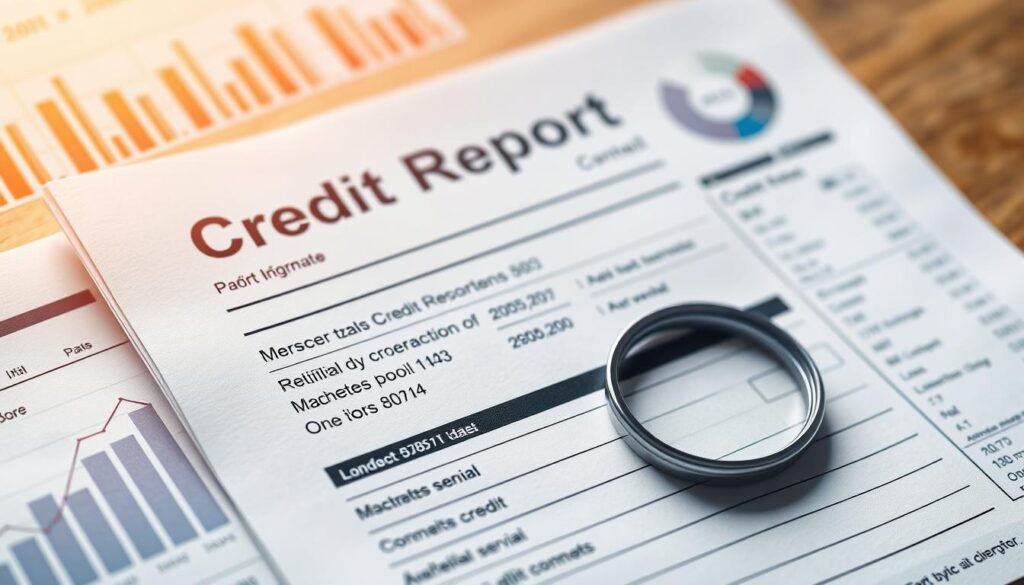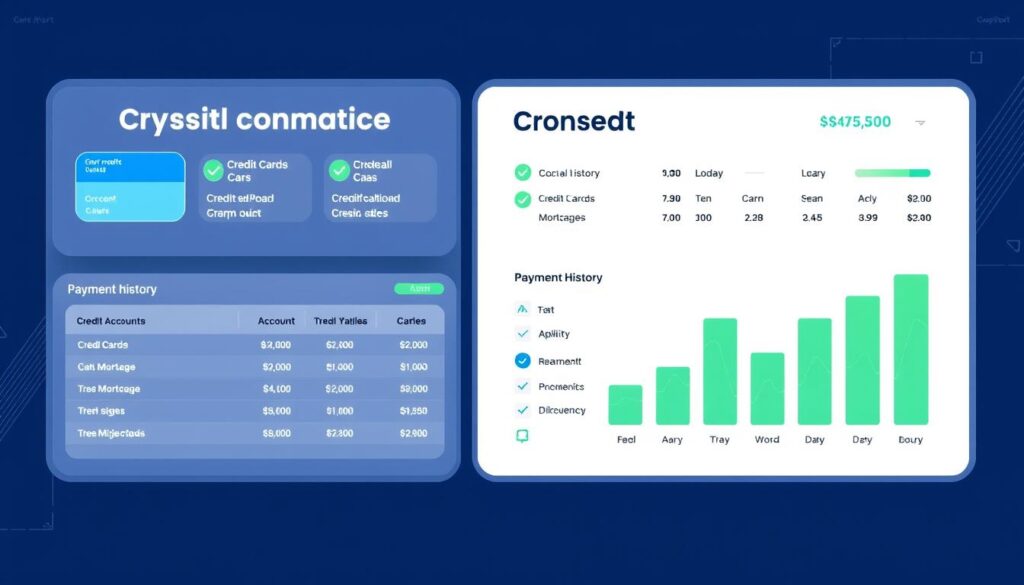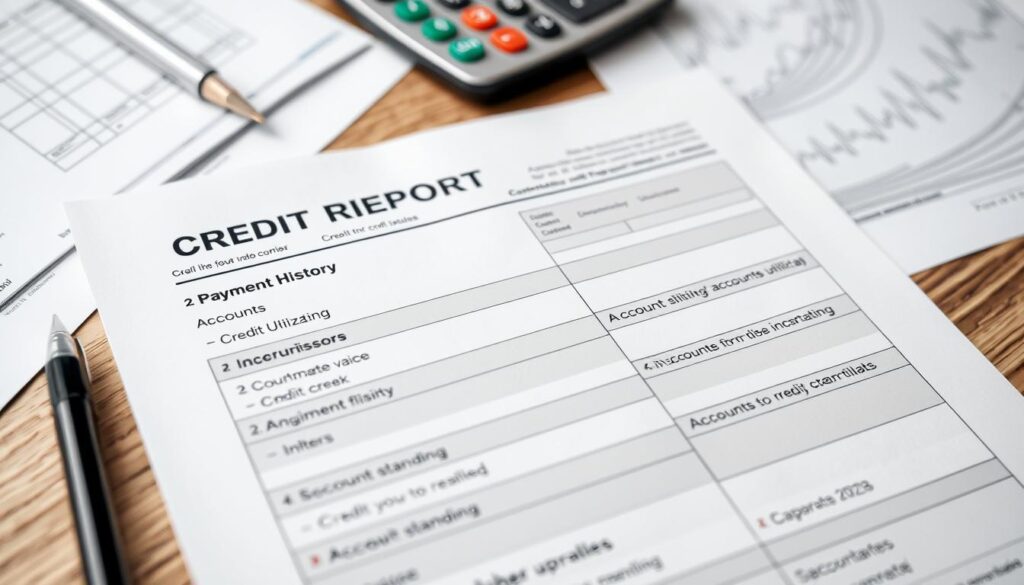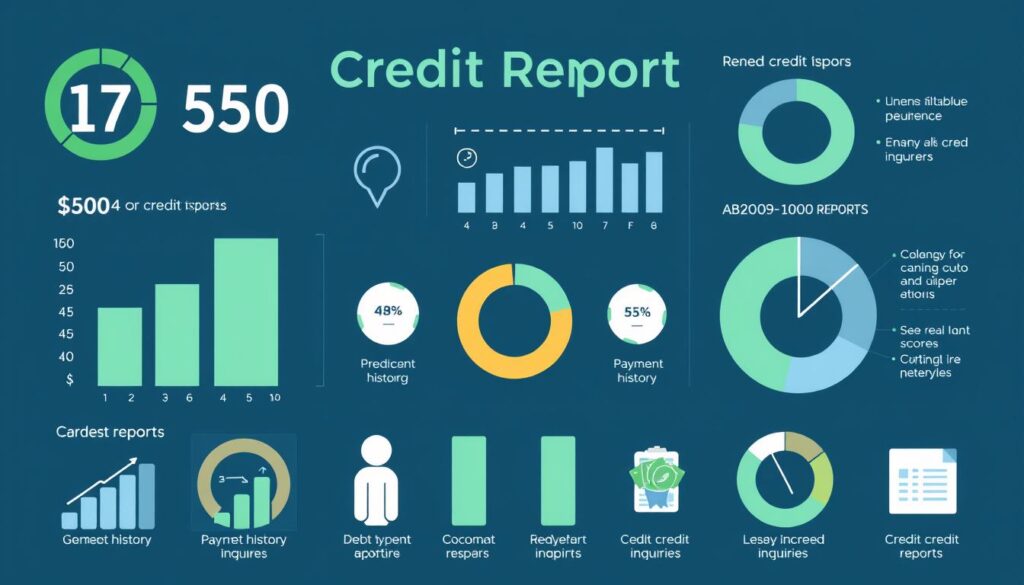Understanding your credit report’s factual data is vital for managing your personal finances. This information helps lenders evaluate your creditworthiness. Knowing your credit report details can help you maintain a healthy financial profile.
We’ll explore the types of factual data in your credit report and their importance. We’ll also discuss how to ensure this information’s accuracy. This breakdown will cover personal details, credit history, and public records.
Key Takeaways
- Factual data on your credit report includes personal identification, employment, credit accounts, and public records information.
- Accurate factual data is crucial for lenders to make informed decisions about your creditworthiness.
- Understanding the different types of factual data can help you identify and dispute any inaccuracies in your credit report.
- Regularly monitoring your credit report and maintaining responsible credit management practices can ensure the integrity of your factual data.
- Factual data has a significant impact on your credit scores, which in turn affects your ability to access credit, loans, and other financial opportunities.
Understanding Factual Data in Your Credit Report
Your credit report contains vital information about your financial history. Lenders and creditors use this data to assess your creditworthiness. Understanding the credit report truth is crucial for your financial well-being.
This factual data impacts your credit score and access to financial products. It’s essential to ensure your accurate credit report details are up-to-date.
Importance of Accurate Credit Information
Accurate credit information is crucial in today’s financial world. Lenders use this data to evaluate your risk profile. They also use it to determine loan terms and conditions.
Unverified credit report entries can lead to unfavorable lending decisions. It’s vital to ensure your credit report reflects your true financial standing.
Types of Factual Data Found in Credit Reports
Your credit report includes various accurate credit report details. These details paint a comprehensive picture of your financial situation.
- Personal identification information, such as your name, address, and Social Security number
- Employment history and income sources
- Credit accounts, including credit cards, loans, and mortgages, along with payment histories
- Public records, such as bankruptcies, liens, and judgments
- Credit inquiries, both hard and soft, that have been made on your credit file
Knowing the types of verified credit report entries is important. This knowledge helps you maintain a healthy credit profile.
Regularly checking your credit report allows you to spot and address any inaccuracies. This practice ensures your financial reputation remains intact.
Personal Identification Information
Your credit report is a vital record of your financial history. It contains your personal identification information. This data includes your name, address, Social Security number, and birth date.
Lenders and creditors use this information to verify your identity. They ensure the accuracy of details in your credit report. Keeping this information up-to-date is crucial for your financial well-being.
Accurate personal details prevent complications when seeking credit or loans. They also help avoid identity-related issues. Regular review of your credit report helps spot and fix any errors.
| Personal Identification Details | Importance |
|---|---|
| Full Legal Name | Ensures accurate identification and credit history association |
| Current and Past Addresses | Helps lenders verify your residency and creditworthiness |
| Social Security Number | Uniquely identifies you and links your financial records |
| Date of Birth | Confirms your identity and age, which can impact credit decisions |
Monitoring your personal information in your credit report is essential. It ensures your financial profile accurately reflects your identity. This empowers you to make informed decisions and maintain good credit.

“Accurate personal identification information is the cornerstone of a reliable credit report, enabling lenders to make informed decisions and protecting you from identity-related issues.”
Employment and Income Details
Your credit report contains vital credit report facts about your work history and income. This credit report information helps lenders assess your financial stability and repayment ability.
Verifying Employment History
Credit reports may list your current and past employers. They also show how long you’ve worked at each job. Lenders use this data to check your job stability.
Income Sources and Amounts
The report might include details about your income sources. This can cover salary, bonuses, and other forms of pay. Lenders review this to ensure you can manage your debts.
“Accurate employment and income data on your credit report can significantly impact your ability to secure financing, such as a mortgage or auto loan.”
Understanding your credit report’s job and income details is crucial. It helps you grasp how lenders will view your financial profile. This knowledge can improve your chances of getting loans.
Credit Accounts and Payment History
Your credit report holds vital facts about your credit accounts. It includes details on credit cards and loans. This information helps determine your creditworthiness and financial health.
Revolving Accounts (Credit Cards)
Credit card details are key in your credit report. It shows your credit limit, account opening date, and status. Your payment history is also included.
Lenders use this data to assess how well you manage credit. They also use it to gauge your overall credit risk.
Installment Loans (Auto, Personal, etc.)
Your credit report also includes facts on installment loans. These can be auto loans, personal loans, or student loans. It shows the loan amount, interest rate, and repayment terms.
Lenders look at this data to evaluate your debt management skills. They use it to decide if you’re creditworthy for future loans.
Accuracy of credit report facts and credit report information is crucial. Review your credit report often. Dispute any errors you find.
This ensures your financial profile is correctly shown. It can impact your access to credit and the terms offered.

“Maintaining a positive credit account and payment history is a key factor in building a strong credit profile.”
Public Records and Legal Information
Your credit report includes more than just your credit accounts and payment history. It may contain important public records and legal information. These entries can greatly affect your creditworthiness.
Public records on your credit report may include bankruptcies, liens, and civil judgments. Bankruptcies show major money troubles. Liens and judgments point to unpaid debts or legal obligations.
These credit report facts help lenders judge your credit risk. They use this info to decide if you’re eligible for loans.
- Bankruptcies stay on your credit report for 7-10 years, depending on the type.
- Liens and civil judgments can remain for up to 7 years after resolution.
Check your credit report often to make sure all info is correct. Wrong or old public record data can hurt your creditworthiness.
Errors can make it harder to get loans or good loan terms. Fixing these issues helps protect your financial health.
“Maintaining the accuracy of your credit report, including public records and legal information, is essential for building and protecting your financial well-being.”
Know how public records and legal info affect your credit report. This knowledge helps you take action to fix problems and keep a strong credit profile.
What Is Factual Data On My Credit Report
Factual data on your credit report realities includes objective, verifiable details. This covers personal info, job history, and credit account data. Subjective data, however, is based on opinions or judgments about your creditworthiness.
The credit report actualities can greatly affect your financial health. Errors in factual data may harm your credit report authenticity. This can limit your access to financing.
Distinguishing Factual from Subjective Data
Factual data on your credit report includes:
- Personal identification information (name, address, date of birth)
- Employment and income details
- Credit account information (type, balance, payment history)
- Public records (bankruptcies, liens, judgments)
Subjective data, on the other hand, may include:
- Creditor’s assessment of your creditworthiness
- Reasons for credit denials or adverse actions
- Explanatory notes from creditors
Importance of Factual Data Accuracy
Accurate factual data on your credit report realities is vital. It directly impacts your credit score and financial opportunities. Errors in personal info or credit details can lead to unfair decisions.
Inaccuracies can hinder your financial progress. They may limit your access to various financial products and services.
“Ensuring the credit report actualities on your credit report are accurate and up-to-date is a critical step in maintaining a healthy financial profile.”
Credit Inquiries and Their Impact
Your credit report logs requests from lenders to check your credit info. These are called credit inquiries. It’s vital to know the difference between “hard” and “soft” inquiries. They can affect your credit report facts and credit report information differently.
Hard Inquiries vs. Soft Inquiries
Hard inquiries happen when you ask for new credit. This includes credit cards, loans, or mortgages. They can slightly lower your credit score.
Soft inquiries are for pre-approvals, job checks, or personal credit reviews. These don’t affect your credit score at all.
- Hard inquiries: Occur when you apply for new credit and can slightly lower your credit score.
- Soft inquiries: Made for pre-approvals, employment checks, or personal credit report reviews, and do not impact your credit score.
Knowing the difference between hard and soft inquiries is key. It helps you understand how they affect your credit report facts.
Keep track of inquiries on your report. This can help you manage your credit well. It also ensures your credit info is accurate.
“Monitoring your credit report regularly and understanding the difference between hard and soft inquiries is crucial for maintaining a healthy credit profile.”
Disputing Inaccurate Factual Data
Found incorrect credit report facts on your file? You can challenge them with credit bureaus. This process ensures your report accurately shows your financial status.
Here’s how to dispute inaccurate data:
- Identify the specific errors on your credit report.
- Gather supporting documentation to substantiate your claim.
- Contact the credit bureau(s) directly, either online, by mail, or by phone, to initiate the dispute process.
- Provide a detailed explanation of the inaccuracies and submit your evidence.
- Monitor the status of your dispute and respond promptly to any requests for additional information.
Credit bureaus must investigate disputed items by law. They’ll provide results within a set timeframe. If info is wrong, they must fix or remove it.
“Maintaining accurate credit report facts is essential for building a strong financial foundation and accessing favorable credit terms.”
Disputing inaccurate factual data helps keep your credit profile accurate. It shows your true creditworthiness and financial responsibility.

| Dispute Step | Description |
|---|---|
| Identify Errors | Carefully review your credit report to pinpoint any inaccuracies or discrepancies. |
| Gather Evidence | Collect supporting documentation, such as payment receipts or account statements, to substantiate your claim. |
| Contact Credit Bureaus | Initiate the dispute process by contacting the credit bureaus through their online, mail, or phone channels. |
| Provide Explanation | Clearly explain the inaccuracies and submit your evidence to the credit bureaus. |
| Monitor Progress | Follow up on the status of your dispute and respond promptly to any requests for additional information. |
Monitoring and Maintaining Factual Data
Keeping your credit report facts accurate is vital for financial health. Regular checks help spot issues and protect your credit standing. Reviewing your credit report information can uncover discrepancies or potential fraud.
Regular Credit Report Checks
Check your credit report from Equifax, Experian, and TransUnion yearly. This helps verify your personal details, employment, income, and credit accounts.
Ensure all information is correct and current. Regular reviews can catch errors early and prevent financial problems.
Fraud Alert and Credit Freezes
Consider placing a fraud alert or credit freeze on your files. Fraud alerts make creditors verify your identity before opening new accounts.
Credit freezes limit access to your report. This makes it harder for thieves to open accounts in your name.
Monitoring your credit report facts actively protects your financial standing. Implementing safeguards maintains the integrity of your credit report information. These steps help reduce the risk of fraud affecting your finances.
Impact of Factual Data on Credit Scores
Your credit report facts form the basis of your credit score. This score shows how likely you are to repay loans. Knowing how these facts affect your score is key to financial health.
Payment history is the top factor, making up 35% of your score. Paying bills on time shows lenders you’re reliable. Credit utilization accounts for 30% of your score. Keep your credit card balances low to boost your rating.
Public records can harm your credit score. These include bankruptcies, foreclosures, and tax liens. Such negative items can stay on your credit report for up to 10 years.

Credit scoring models may differ, but the main idea stays the same. Credit report information that shows financial responsibility is vital. Understanding this data helps you manage your credit better.
By taking action based on these facts, you can improve your financial standing. This knowledge empowers you to reach your money goals more effectively.
Best Practices for Accurate Credit Reporting
An accurate credit report is vital for your financial health. Good credit report management ensures a true picture of your creditworthiness. Adopt responsible practices to keep your report in top shape.
Responsible Credit Management
Responsible credit management forms the basis of an accurate credit report. Here’s what it includes:
- Utilizing credit responsibly by keeping balances low and using a mix of credit types
- Paying all bills on time, including credit card payments, loans, and other financial obligations
- Monitoring your credit report regularly for any errors or unauthorized activities
Timely Payments and Dispute Resolution
Paying on time and fixing disputes quickly keeps your credit report accurate. Follow these best practices:
- Make all payments on time, every time, to avoid negative items on your credit report
- If you identify any inaccuracies in your credit report, initiate a dispute process with the credit reporting agencies to have them corrected
- Regularly review your credit report to catch and resolve issues before they impact your creditworthiness
These practices help you manage your credit report effectively. They ensure an accurate picture of your financial history. This can lead to better credit terms and opportunities.
Resources for Understanding Credit Reports
Understanding your credit report can be challenging. Luckily, many reliable resources can help you grasp credit report facts and information. These resources offer valuable insights to keep your credit data accurate.
Government Agencies
- The Consumer Financial Protection Bureau (CFPB) offers comprehensive credit report information and guides on disputing errors.
- The Federal Trade Commission (FTC) provides educational resources on credit reports, identity theft, and consumer rights.
Consumer Advocacy Organizations
- The National Consumer Law Center publishes guides and fact sheets on understanding and managing credit reports.
- The Consumer Federation of America offers free credit report resources and tips for maintaining healthy credit.
Credit Education Websites
Experian, Equifax, and TransUnion offer detailed information on credit reports. They explain how to read and interpret reports. These sites also guide you on fixing inaccuracies.
“Understanding your credit report is the first step towards taking control of your financial future.”
These resources help you understand credit report facts and credit report information. With this knowledge, you can make smart financial choices. You’ll be better equipped to maintain a healthy credit history.
Conclusion
Your credit report’s factual data is crucial for your financial health. It includes personal details, employment history, credit activity, and public records. This information shapes your financial standing.
Regular monitoring of your credit report facts is essential. Address any inaccuracies promptly. This helps maintain the integrity of what is factual data on my credit report.
Your credit report is the basis for creditworthiness assessments. It’s used by lenders and financial institutions. Stay vigilant about your credit information.
Taking ownership of your credit data can open new doors. It can help you secure better terms. This paves the way for a stronger financial future.

